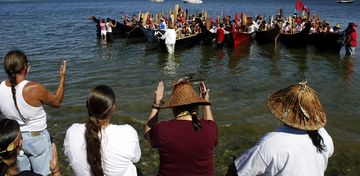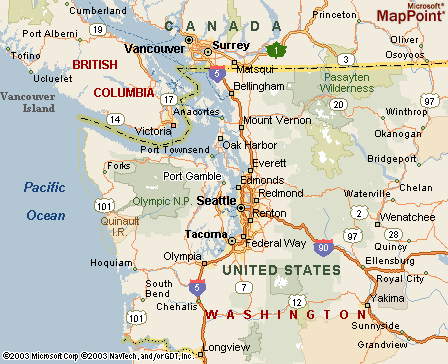|
|
Canku Ota |
|
|
(Many Paths) |
||
|
An Online Newsletter Celebrating Native America |
||
|
July 31, 2004 - Issue 118 |
||
|
|
||
|
Suquamish and S'Klallam
Tribes |
||
|
by Susie L. Oh, (Bremerton, WA) Sun Staff |
||
|
credits: photo: Members of five tribes arrived via canoe on the shores of Suquamish on Thursday as part of an annual canoe journey. The tribes were welcomed by Suquamish leaders and their visit was celebrated with a feast of grilled salmon, songs and socializing before the tribes camped for the evening. |
|
A 200-mile canoe trip to Canada will be a demonstration of physical and spiritual fitness.
"We say anyone who calls it that gets thrown in the water,' said Port Gamble S'Klallam Tribe member Mary Trevathan, with a smile. To simply call it a "boat" does seem a clunky description. The long, low, smooth vessels are used by canoe nations around the Pacific Northwest and Canada to connect tribes and their business. While the tradition lay dormant for years in many tribes, the customs are changing. Canoe journeys have become more frequent and popular in the last decade, said Suquamish Tribal Chairman Bennie Armstrong. As a result, every year the extended tribal canoe family comes together to make a long journey. This year the Suquamish and Port Gamble S'Klallam tribes will be part of a group travelling almost 200 miles in traditional cedar and the modern fiberglass canoes. Their destination is Ladysmith, British Columbia, Canada, where they will meet with the Chemainus Tribe. The journey will take two weeks for the Suquamish and S'Klallam paddlers, and longer for tribes coming from even farther away. About 30 canoes and several thousand people, both paddlers and support staff, are expected in Ladysmith the first week of August. As part of the trek, the Suquamish and S'Klallam tribes are hosting other canoe nations making their way north. On Thursday afternoon, a line of canoes that had paddled six miles from Muckleshoot dotted the horizon as they slowly made their way to the Suquamish beach, where members of the tribe were preparing a feast. The canoes lined up just off the shore and one by one the visiting tribes Squamish, Squaxin, Nisqually, Puyallup, and Muckleshoot shouted greetings and asked for permission to come ashore. Each tribe was welcomed individually by a Suquamish Tribe leader. On Saturday, the Suquamish Tribe will put its canoes in the water and travel with the growing cedar fleet to Port Gamble. There, they will be hosted for the night by the S'Klallam Tribe, and the celebration will be repeated. While canoe journeys are full of ceremony, Armstrong is quick to point out that it's not just for show. "It's not a re-enactment, this is who we are," he said. "This is for us, for our spiritual rebirth." It's cultural as well as spiritual, according to Marilyn Wandrey, a canoe leader from the Suquamish Tribe. Wandrey pointed to young tribal member Max Dawes as he toddled by, clutching a leather drum. "He's the fruit of our efforts," she said, noting proudly that the 2-year-old can already sing in the Suquamish native language Lushootseed. The canoe journeys are a part of the push to rediscover a heritage tribe members were not always taught to be proud of, Wandrey said. That message is not lost on tribal youth. At a canoe practice earlier this week, S'Klallam Tribe paddler Bethany Swift, 18, said being on the water gives her time to think. "When you're on the water you don't think about 'Is so-and-so going to call me?' and stuff," said Swift. "It's more about 'This is what our ancestors did, how they lived their life'." Swift said the elders in her tribe are proud of the youth taking part in the canoe journey. "The main goal is to introduce our young people to the culture and teach them a drug-free life," said Trevathan, who a skipper on one of the S'Klallam's three crews. It's empowering for adults and youth who have struggled with drug or alcohol abuse to see others who have overcome the same problems on the canoe journey, said S'Klallam skipper Mike Jones. "They think if others can do it, they can do it too," Jones said. The positive effect of involvement in canoe trips extends beyond substance abuse prevention. Wandrey, who owns her own canoe that she takes on the journey every year, said proudly that all high school seniors on her Suquamish canoe graduated this year. "That,' she said, "is how powerful it is." |
|
|
www.expedia.com |
|
|
||
|
|
||
| Canku Ota is a free Newsletter celebrating Native America, its traditions and accomplishments . We do not provide subscriber or visitor names to anyone. Some articles presented in Canku Ota may contain copyright material. We have received appropriate permissions for republishing any articles. Material appearing here is distributed without profit or monetary gain to those who have expressed an interest. This is in accordance with Title 17 U.S.C. Section 107. | ||
|
Canku Ota is a copyright © 2000, 2001, 2002, 2003, 2004 of Vicki Barry and Paul Barry. |
||
 |
 |
|
|
The "Canku Ota - A Newsletter Celebrating Native America" web site and its design is the |
||
|
Copyright © 1999, 2000, 2001, 2002, 2003, 2004 of Paul C. Barry. |
||
|
All Rights Reserved. |
||
 Call
a Native American canoe a "boat" and you will get a quick
reprimand.
Call
a Native American canoe a "boat" and you will get a quick
reprimand.